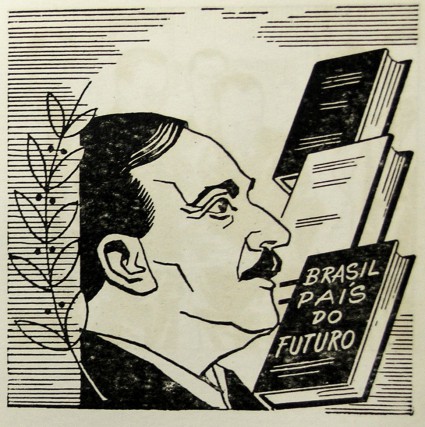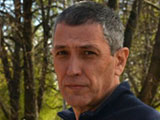The World of Yesterday
by Israel Centeno / January 30, 2014 / No comments
Exile, refuge, and life on the outside.

Austrian writer Stefan Zweig, who went into 'voluntary exile' in 1934. Photo: Alexander Kohlhofer via Flickr.
The subject of exile is addressed from many differing viewpoints. Sometimes I have a great fear of opinions that focus on the literal meaning of the word, as they tend to be confined to dictionary definitions and are resistant to the possibility of changing the significance of this unsettled term. Ex·ile (n.): Always on the periphery and, by nature, essentially foreign. Displacement is a dynamic action that accompanies us all through different scenes and scenarios throughout our lives. In one way or another, we’ve all been expelled from previous states and no one leaves their space without being condemned to diaspora.

- From his lonely watch post Albert Camus asked who among us has not experienced exile yet still managed to preserve a spark of fire in their soul. “We’re all alone,” Natalia Sedova cried in exile on hearing of her husband Leon Trotsky’s affair with Frida Kahlo. In his novel Night Watch, Stephen Koch follows the incestuous love affair of David and Harriet, wealthy siblings watching the world from their solitary exile. Koch’s writing, Camus’s theories, and Trotsky’s affair all come back to exile and lead me to reflect on the human condition. From my own vantage point, my Night Watch, I will reflect on my questions of exile, writing, and the human condition.

- Israel Centeno was born in 1958 in Caracas, Venezuela, and currently lives in Pittsburgh as a Writer-in-Residence with City of Asylum/Pittsburgh. He writes both novels and short stories, and also works as an editor and professor of literature. He has published nine books in Venezuela and three in Spain.
Expulsion seems to be part of the human condition, alongside the need to settle. Everyone still settles somewhere, even when they can see themselves leaving; nobody leaves without setting down roots.
A feeling of dread accompanies any mention of exile, as does a feeling of maliciousness in granting it. Political exile begins when a singular way of thinking and view of the landscape is imposed, when the person speaking on behalf of the group refuses to recognize an individual, condemns their differences—calling them unfavorable, recalcitrant, someone who must be quashed—and only names the individual to divest them of their connections and citizenship. Absolute truth is exclusive. The moment that, in the name of collective values, an individual is stripped of their attachments, the lines between a shared place and despotism become blurred; the collective and the individual are switched.
Over the last few days, I’ve been mulling over the meaning of the word “exile.” There are those who confuse exile with refuge or asylum and claim that one of its conditions is detention or execution. But exile and refuge are not necessarily related terms, given that even in refuge, the exiled person remains on the outside.
To understand this concept, it would be sufficient to read the works of Stefan Zweig, who planned his voluntary exile in 1934 as Austria began to fall into the hands of the Nazis. He then went into exile (at first without a definitive break from Austria, as he would return to visit his family on various occasions, until he was divested of his passport and nationality in 1938). Eventually, he saw how refuge and asylum were never enough to fill the depressive void created by exclusion. In his autobiography, The World of Yesterday, Zweig recognizes that he had lost Europe as a spiritual homeland, and what I have gathered from the following lines goes beyond any semantic orthodoxy: “I have nothing more of my past with me than what I have retained in my mind. All else at this moment is unobtainable or lost. […] When […] I left my home, the pleasure of collecting was gone and also the certainty of being able to preserve anything lastingly. […] So I do not lament what I once owned; for, if we, driven and hunted in these times, which are inimical to every art and every collection, were put to it to learn a new art, it would be that of parting from all that had once been our pride and our love.”




